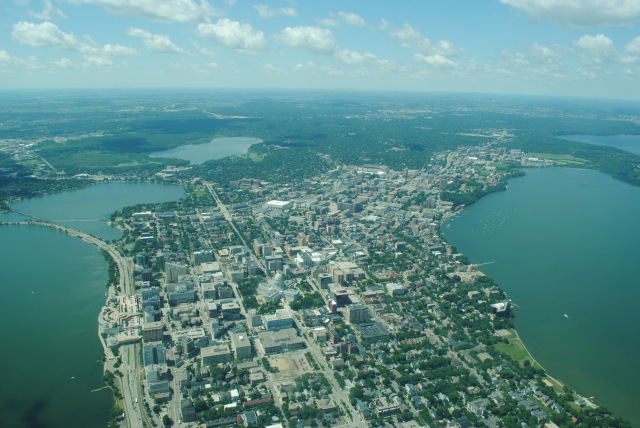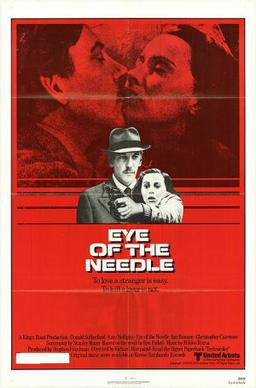Post by Jenny Seifert, science writer/outreach coordinator
Six years ago, a group of UW-Madison researchers from different walks and stages of the scholarly life came together to put the place where they live, the Yahara Watershed, and its future under the microscope, so to speak. With funding from the National Science Foundation’s Water Sustainability and Climate (WSC) program, we set out to find answers to big questions, such as what could life in the watershed be like in two generations, how could climate and land-use change impact lakes and rivers, and how can people ensure the watershed remains a healthy place to live, work and play?

The Yahara watershed contains Wisconsin’s capital, Madison, and thousands of acres of valuable farmland, a complex landscape that lends itself well to scientific inquiry. Credit: UW-Madison WSC Project
Now, our work has come to an end…sort of. The funding that got us started has ended, but this does not bring our work on these issues to a close.
In a way, our WSC funding was merely a launching pad. We now have perhaps more questions than we started with – scientific inquiry tends to beget more scientific inquiry, after all.
One next step for the team is to work in collaboration with local stakeholders on translating our big-picture findings into more tangible on-the-ground solutions for improving our lakes and landscapes, for example. Over the next few years, more publications will emerge from our analyses, and members from our team are pursuing other opportunities to explore the new questions we’ve harvested from this work.
Before we move on, some of us took time to reflect on what the experience on the WSC project has taught us, and the following are our personal words. This project has certainly changed us all, and we hope the results of our work can contribute to the collective effort to build a resilient and desirable future for not just the Yahara watershed, but also all of Wisconsin.
Solutions require collaboration“In order to help guide improved management and decision-making at the local level, you have to build scientific credibility with stakeholders who are faced with making tough decisions, and then involve them as part of the research, education, and, outreach process to ensure that new information, data, and perspectives become part of long-term discussions. This process helps build mutual respect and strengthens the concept of “teamwork” among different groups of people that share a similar goal of improving the environment. Without this integration, solving our local water quality problems is unlikely to happen in a timeframe – and at a cost – that is deemed acceptable to society. Likewise, it is equally important to carry out integrated social-ecological research in this approach, which involves building teams of investigators that are patient and willing to learn about the value of each other’s work.”
— Chris Kucharik, lead principal investigator, professor of agronomy and environmental studies, UW-Madison
“For me, the most valuable experience from the WSC project was the exposure to interdisciplinary and collaborative research, which is critical to achieve an enhanced understanding of the complex social-ecological systems and explore solutions to social-ecological challenges. It provided valuable opportunities for me to interact and learn from the other experts on the team, including modelers, social scientists, agronomists, ecologists, and hydrologists. Such experience helped me gain a better appreciation about the depth, horizon, and richness of scientific inquiry, as well as develop skills that are essential for my future research career.”
— Jiangxiao Qiu, former WSC graduate student, now assistant professor at the University of Florida
Respect the slow“As for the ‘big lesson,’ not surprisingly I think it is to ‘respect the slow.’ For the next century or more, the Yahara will be coping with the fallout of two legacies – greenhouse gases in the atmosphere with a residence time of a century or so, and phosphorus in soil with a residence time of 250 years or so. The founders of limnology [the study of inland waters] – Edward Asahel Birge, Chancey Juday, Arthur Hasler – had no conception of these threats. They thought they were dealing with a human sewage problem. Now we know that these legacies are driving the water quality of Yahara lakes and appear to be offsetting the millions of dollars we have spent so far to clean up the lakes. If we want clean water, we need much more extensive and innovative deployment of land use and land management options for countering the effects of the soil phosphorus legacy and increasing precipitation events. This is going to require institutions that take a long view; the development of such institutions also requires new innovative thinking. Building appropriate institutions, improving land use and management, and taking a long view so we do not create new and potentially disastrous legacies for future generations is the current challenge, in a nutshell.”
— Stephen Carpenter, principal investigator, professor (now, emeritus) of limnology, UW-Madison
“I think one of the most valuable things to come out of the WSC project is an appreciation that change will be slow and incremental – from both a biophysical and social point of view. Things won’t get better overnight. So it’s important that we stay focused on long-term goals, evaluate what’s working, and adjust as necessary, given the uncertainty surrounding the future.”
— Sam Zipper, former WSC Graduate Student, now postdoctoral fellow at McGill University
A holistic perspective“For me, one of the most valuable things to come out of WSC is the importance of accounting for all of the drivers of change, wherever they may lead and however deep one needs to go to fully understand them. The connection of water quality to personal consumption habits (e.g., cheese) was especially important to me, and it fit nicely into the whole foundation of the [Yahara 2070] scenarios, where consumers are among the important agents of change. I think we all realize that it’s a very difficult task to have water quality managers fully engage with all of these wide-ranging and often external-to-the-watershed drivers, but it’s a conversation that needs to be started in order to make sure we ultimately get a future that is clearly and equitably decided upon among all impacted people.”
— Eric Booth, research scientist, agronomy and civil & environmental engineering, UW-Madison
“WSC required project members and other collaborators to think holistically about watershed management, and how that might change in the future. This was great training for me as a researcher, as the watershed was both a research boundary and an opening for cross-disciplinary thinking.”
— Chloe Wardopper, former WSC graduate student, now assistant professor at the University of Idaho
Our decisions are paramount“In studying this watershed and the many pathways it could take, I learned of the power we have in determining our own future. That power extends across different scales of course, from what we do here in the watershed to manage our lands and waters, to how we tackle global climate change as a species. But while it often feels to me that natural resources are dwindling and the climate is spiraling out of control, the reality is that we can set the ship right if we so choose. Our decisions are paramount and deserve the most careful consideration.”
— Melissa Motew, former WSC graduate student, now Ecosystem Services Fellow at The Nature Conservancy
“How we use the land influences water quantity and quality, determines how much food we produce, and the controls the storage of carbon in soils of the watershed. While climate is the primary driver of flows of water and nutrients to our lakes, it interacts with physical processes and land use through myriad complex responses, not all of which are well quantified. While the adverse effect of shallow groundwater on crop production is widely recognized, the substantial positive influence of shallow groundwater in irrigated croplands was underappreciated in the watershed and suggests management strategies that could increase food production. Another unappreciated response associated with urbanization and the urban heat island effect is a subsequent lengthening of the growing season and increased water demand for vegetated patches that remain in the city.”
— Steven Loheide, principal investigator, professor of civil & environmental engineering, UW-Madison
Connected with our place – and each other“Working on the WSC project allowed me to connect with my community in an entirely different way. Talking with several dozen managers and residents throughout the process of doing my work really drove home for me the value and importance people place on their landscape, as well as how hard many others are working to improve where they live. Seeing the larger project unfold also served as a good reminder that it is possible to combine strong science, compelling storytelling, and community engagement.”
— Carly Ziter, WSC graduate student and PhD candidate, UW-Madison
“Benefits of this research are numerous. Perhaps of greatest importance is that we really did generate new understanding of the landscape in which we live and work — how what we do on the land affects the water, how valuable the environment is for all of us, how the Yahara may change in the future, and how it is possible for all of us to collectively craft a desirable future. We made a substantial leap forward in understanding the Yahara and quantifying the many benefits it provides.
Personally, I learned a tremendous amount from my colleagues on this project — the faculty, postdocs, students and staff — especially in topics that were beyond my own expertise. The success of the project hinged on multiple perspectives and the contributions from all. As an educator, it was gratifying to mentor the next generation of scientists and to watch them grow and flourish as independent scientists. I am encouraged to know there are many well-trained researchers ready and able to continue unraveling the mysteries of this world, along with many citizens who care deeply about the future of our shared environment and are ready and able to work together to protect it.”
— Monica Turner, principal investigator, professor of zoology, UW-Madison
The results of our WSC work will remain available on our website.
Advertisements Share this:




